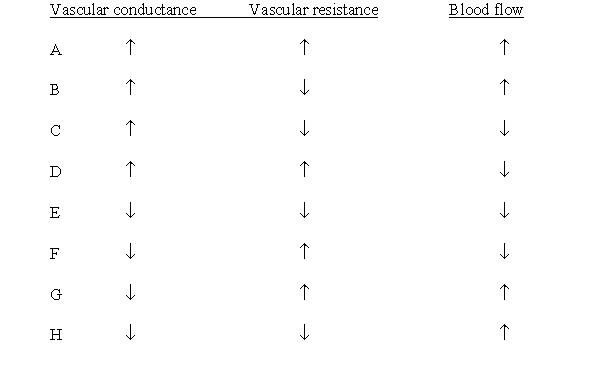Deck 14: Overview of the Circulation; Biophysics of Pressure, Flow, and Resistance
Question
Question
Question
Question
Question
Question
Question
Question
Question
Question
Question
Question

Unlock Deck
Sign up to unlock the cards in this deck!
Unlock Deck
Unlock Deck
1/12
Play
Full screen (f)
Deck 14: Overview of the Circulation; Biophysics of Pressure, Flow, and Resistance
1
If the blood flow through the kidney is 1200 mL/min and the renal artery pressure is 100 mm Hg and the renal venous pressure is 0 mm Hg, which of the following is the conductance (in mL/min/mm Hg) of the renal vessel?
A)2
B)4
C)8
D)12
E)16
A)2
B)4
C)8
D)12
E)16
D
2
An increase in shear stress in a blood vessel would result in which of the following changes?
A)Decreased endothelin production
B)Decreased cyclic guanosine monophosphate production
C)Increased nitric oxide release
D)Increased renin production
E)Decreased prostacyclin production
A)Decreased endothelin production
B)Decreased cyclic guanosine monophosphate production
C)Increased nitric oxide release
D)Increased renin production
E)Decreased prostacyclin production
C
3
An increase in which of the following would decrease blood flow across a vessel?
A)Hydrostatic pressure gradient
B)Diameter of vessel
C)Blood viscosity
D)Plasma colloid osmotic pressure
A)Hydrostatic pressure gradient
B)Diameter of vessel
C)Blood viscosity
D)Plasma colloid osmotic pressure
C
4
Which of the following components of the circulation has the lowest velocity of blood flow?
A)Arteries
B)Venules
C)Veins
D)Aorta
E)Capillaries
A)Arteries
B)Venules
C)Veins
D)Aorta
E)Capillaries

Unlock Deck
Unlock for access to all 12 flashcards in this deck.
Unlock Deck
k this deck
5
The diameter of a precapillary arteriole is increased in a muscle vascular bed. A decrease in which of the following would be expected?
A)Capillary filtration rate
B)Vascular conductance
C)Capillary blood flow
D)Capillary hydrostatic pressure
E)Arteriole resistance
A)Capillary filtration rate
B)Vascular conductance
C)Capillary blood flow
D)Capillary hydrostatic pressure
E)Arteriole resistance

Unlock Deck
Unlock for access to all 12 flashcards in this deck.
Unlock Deck
k this deck
6
A 78-year-old woman has a mean arterial pressure of 120 mm Hg and a heart rate of 60 beats/min. She has a stroke volume of 50 mL, cardiac output of 3000 mL/min, and a right atrial pressure of 0 mm Hg. What is the total peripheral resistance (in mm Hg/mL/min) in this woman?
A)0.01
B)0.02
C)0.04
D)0.08
E)0.10
A)0.01
B)0.02
C)0.04
D)0.08
E)0.10

Unlock Deck
Unlock for access to all 12 flashcards in this deck.
Unlock Deck
k this deck
7
Which vessel has the highest vascular resistance?

Unlock Deck
Unlock for access to all 12 flashcards in this deck.
Unlock Deck
k this deck
8
The arterioles are constricted in a muscle bed of an experimental animal. Which set of physiological changes would be expected to occur in response to constriction of the muscle arterioles? 


Unlock Deck
Unlock for access to all 12 flashcards in this deck.
Unlock Deck
k this deck
9
The table below depicts the pressure gradient, radius, and viscosity in various vessels of the same length. Which vessel has the greatest flow?

Unlock Deck
Unlock for access to all 12 flashcards in this deck.
Unlock Deck
k this deck
10
A 50-year-old woman has a renal blood flow of 1000 mL/min and hematocrit of 50%. Her arterial pressure is 120 mm Hg and her renal venous pressure is 20 mm Hg. She also has a plasma colloid osmotic pressure of 25 mmHg. What is the total renal vascular resistance (in mm Hg/mL/min) in this woman?
A)0.10
B)0.20
C)0.50
D)1.00
E)1.50
A)0.10
B)0.20
C)0.50
D)1.00
E)1.50

Unlock Deck
Unlock for access to all 12 flashcards in this deck.
Unlock Deck
k this deck
11
Which of the following would tend to cause an increase in blood flow?
A)Increase in hematocrit
B)Decrease in arterial pressure
C)Twofold increase in arteriole diameter
D)Twofold increase in blood viscosity
A)Increase in hematocrit
B)Decrease in arterial pressure
C)Twofold increase in arteriole diameter
D)Twofold increase in blood viscosity

Unlock Deck
Unlock for access to all 12 flashcards in this deck.
Unlock Deck
k this deck
12
Under controlled conditions, flow through a blood vessel is 10 mL/min under a pressure gradient of 100 mm Hg. An increase in which of the following would occur in response to a twofold increase in the diameter of the vessel with a pressure gradient maintained at 100 mm Hg?
A)Vascular resistance
B)Hematocrit
C)Vascular conductance
D)Blood viscosity
E)Plasma oncotic pressure
A)Vascular resistance
B)Hematocrit
C)Vascular conductance
D)Blood viscosity
E)Plasma oncotic pressure

Unlock Deck
Unlock for access to all 12 flashcards in this deck.
Unlock Deck
k this deck



